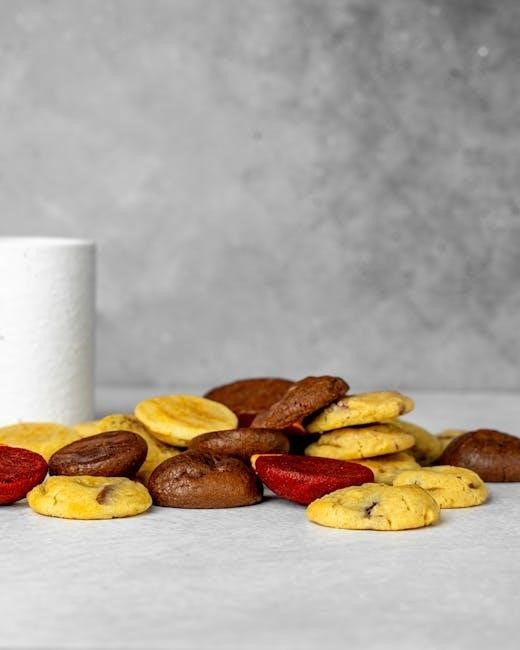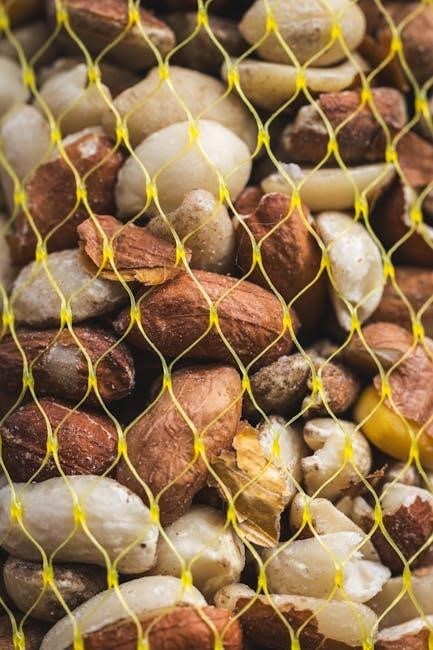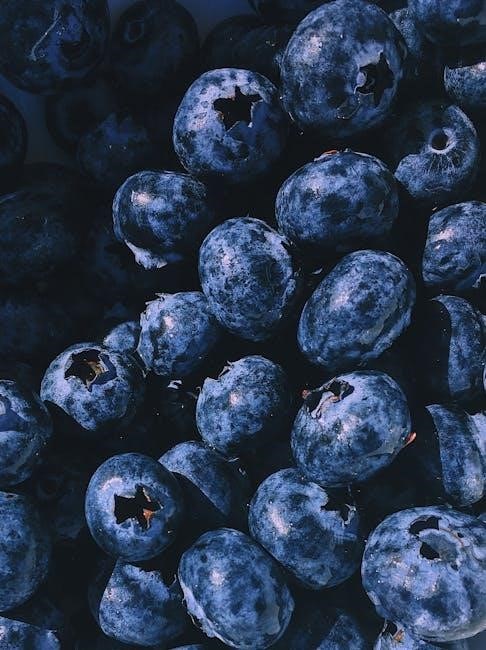gallstones diet sheet pdf
Eating a healthy diet is crucial for managing gallstones, with a focus on low-fat foods and a balanced meal plan, according to recent dietary guidance recommendations online.
Understanding the Importance of Diet in Managing Gallstones
Diet plays a significant role in managing gallstones, with certain foods triggering pain and discomfort. A well-planned diet can help alleviate symptoms and prevent further complications. According to online resources, a low-fat diet is often recommended, as fat can stimulate the gallbladder and exacerbate pain. A balanced meal plan that includes plenty of fruits, vegetables, and whole grains can help regulate digestion and reduce the risk of gallstone formation. Additionally, staying hydrated by drinking plenty of water is essential for overall health and can help prevent gallstones from forming. By making informed dietary choices, individuals can better manage their gallstones and improve their overall quality of life. A healthy diet can also help reduce the risk of other health problems associated with gallstones. Online resources provide guidance on creating a personalized diet plan.

Dietary Guidance for Gallstones
Online resources provide dietary guidance for managing gallstones effectively always.
Key Principles of a Gallstones Diet
The key principles of a gallstones diet involve eating a balanced and healthy meal plan, with a focus on low-fat foods and plenty of fruits and vegetables.
A gallstones diet should include foods that are easy to digest and can help reduce symptoms.
Online resources provide guidance on the best foods to eat and avoid, and how to manage gallstones through dietary changes.
A healthy diet can help reduce the risk of complications and improve overall health.
It is essential to follow a gallstones diet plan that is tailored to individual needs and health status.
By making informed food choices, individuals with gallstones can manage their condition effectively and reduce the risk of further problems.
A gallstones diet should be based on current scientific evidence and guidance from healthcare professionals.
This approach can help individuals with gallstones to manage their condition and improve their quality of life.

Fat Intake and Gallstones
Reducing fat intake helps manage gallstones, with a daily limit of 30-45ml of fat recommended for optimal health benefits online.
Managing Fat in the Diet
Managing fat in the diet is crucial for individuals with gallstones, as it can help reduce symptoms and prevent further complications. A low-fat diet is often recommended, with a focus on healthy fats such as non-hydrogenated margarine, canola oil, and olive oil. It is essential to limit daily fat intake to 30-45ml, which can be achieved by choosing low-fat foods and being mindful of portion sizes. A balanced meal plan that includes plenty of fruits, vegetables, and whole grains can also help manage fat intake and support overall health. By making these dietary changes, individuals with gallstones can help manage their condition and reduce the risk of further complications, according to recent online dietary guidance recommendations. A healthy and balanced diet is essential for managing gallstones and supporting overall health and wellbeing.

Weight Loss and Gallstones
Weight loss can increase the risk of developing gallstones, especially when it occurs rapidly, according to online dietary guidance recommendations and health experts recently.
Understanding the Relationship Between Weight Loss and Gallstones
Research suggests that weight loss can increase the risk of developing gallstones, particularly when it occurs rapidly. This is because during weight loss, the body releases stored cholesterol into the bile, which can then form gallstones. Additionally, weight loss can also cause the gallbladder to contract less frequently, leading to a buildup of bile and increasing the risk of gallstone formation. It is essential to maintain a healthy weight and avoid rapid weight loss to reduce the risk of developing gallstones. A balanced diet and regular exercise can help achieve and maintain a healthy weight, reducing the risk of gallstones and other health problems. By understanding the relationship between weight loss and gallstones, individuals can take steps to protect their health and prevent the formation of gallstones. Regular health check-ups are also crucial.
Healthy Eating with Gallstones
Eating a balanced diet with plenty of fruits and vegetables is essential for managing gallstones and overall health, according to dietary guidance recommendations online daily.
Practical Tips for a Gallstones Diet
To manage gallstones, it is essential to follow a healthy diet, and there are several practical tips that can help, including eating smaller, more frequent meals and choosing low-fat foods. A diet rich in fruits, vegetables, and whole grains can also help alleviate symptoms. Additionally, staying hydrated by drinking plenty of water is crucial. It is also recommended to limit or avoid foods that can trigger symptoms, such as fatty or greasy foods. By following these tips and making healthy lifestyle choices, individuals with gallstones can help manage their condition and reduce the risk of complications. A healthcare professional can provide personalized dietary advice and guidance on managing gallstones, and it is essential to consult with them before making any significant changes to your diet. Regular exercise and a healthy weight can also help.

Treatment of Gallstones
Dietary changes and medical treatment can help manage gallstones, with a focus on healthy eating habits and lifestyle modifications, as recommended by healthcare professionals online.
Dietary Considerations for Gallstones Treatment
Dietary considerations play a crucial role in the treatment of gallstones, with a focus on healthy eating habits and lifestyle modifications. A well-balanced diet can help alleviate symptoms and prevent further complications. According to recent studies, a low-fat diet with moderate amounts of calories from fat is recommended. This can be achieved by consuming healthy fats such as non-hydrogenated margarine, canola oil, and olive oil. Additionally, eating at least five portions of fruits and vegetables daily can help maintain a healthy digestive system. A diet rich in whole grains, lean proteins, and low-fat dairy products can also help manage gallstones. By making these dietary changes, individuals can reduce their risk of developing gallstones and improve their overall health and wellbeing, as supported by online resources and healthcare professionals. A healthy diet is essential for effective treatment and prevention.
A healthy diet is essential for managing gallstones, with online resources providing guidance on nutrition and meal planning for overall wellbeing and health benefits always.
A diet sheet for gallstones typically includes a list of recommended foods and beverages, as well as those to avoid. Online resources provide guidance on nutrition and meal planning. The key is to eat a healthy, balanced diet with moderate amounts of fat. A low-fat diet may be beneficial, but it should not be fat-free. The diet should include plenty of fruits, vegetables, and whole grains. It is also important to stay hydrated by drinking plenty of water. A healthy diet can help manage gallstones and reduce the risk of complications. By following a diet sheet and making healthy lifestyle choices, individuals with gallstones can improve their overall health and wellbeing. A gallstones diet sheet pdf can be a useful resource for individuals looking to manage their condition through dietary changes. It provides a comprehensive guide to healthy eating.
